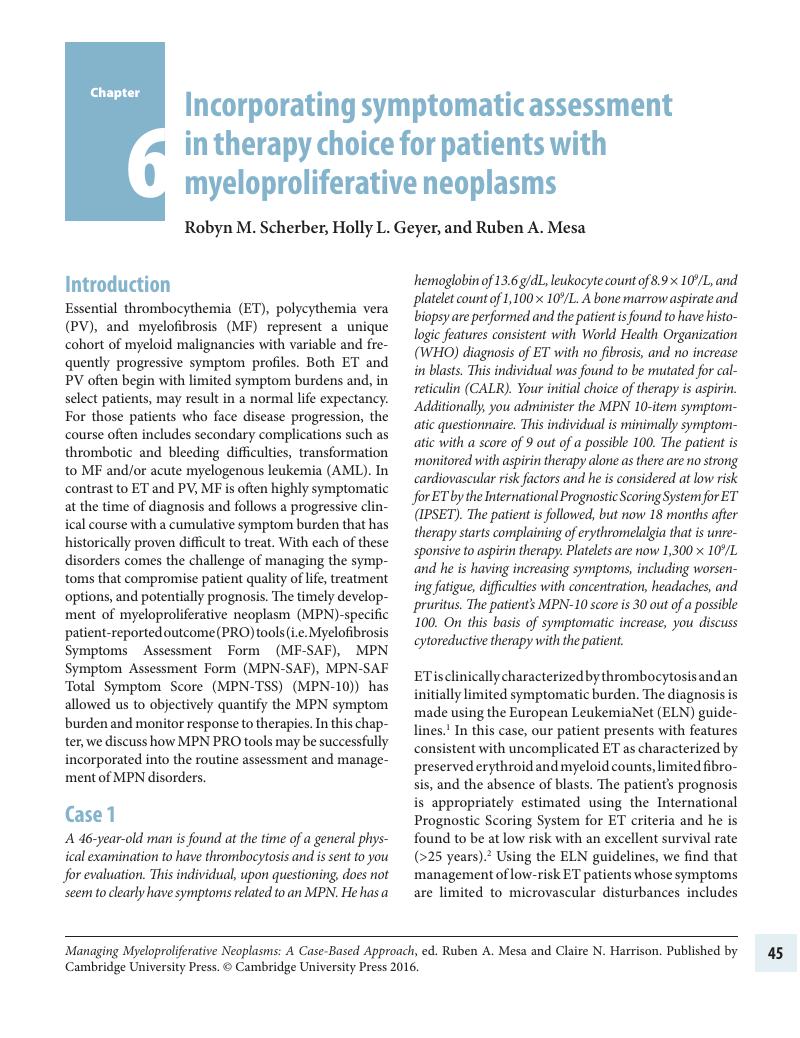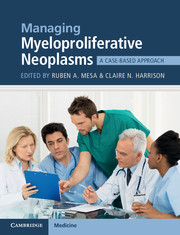Book contents
- Managing Myeloproliferative Neoplasms
- Managing Myeloproliferative Neoplasms
- Copyright page
- Contents
- Contributors
- Preface
- 1 Initial assessment of the undiagnosed patient who has an erythrocytosis, leukocytosis, or thrombocytosis
- 2 Practical approaches to molecular testing and diagnosis of mastocytosis, hypereosinophilia, and MDS/MPN overlap syndromes
- 3 Incidental splenomegaly: an approach to diagnosis
- 4 When to do a bone marrow biopsy and how to interpret it in the diagnosis of myeloproliferative neoplasm
- 5 Accurately assessing risk in your myeloproliferative neoplasm patient
- 6 Incorporating symptomatic assessment in therapy choice for patients with myeloproliferative neoplasms
- 7 The newly diagnosed patient with essential thrombocythemia
- 8 The newly diagnosed patient with polycythemia vera
- 9 Longstanding polycythemia vera and essential thrombocythemia: monitoring and management goals
- 10 Which patients are candidates for JAK inhibitors and how to manage patients on JAK inhibitor treatment
- 11 Hematopoietic cell transplantation for myelofibrosis: who and when?
- 12 Systemic mast cell disease: diagnosis and management
- 13 Hypereosinophilia: an illustrated approach to diagnosis and management
- 14 Myelodysplastic/myeloproliferative neoplasm overlap syndromes
- 15 Atypical chronic myeloid leukemia and chronic neutrophilic leukemia
- 16 Women and children with myeloproliferative neoplasms – special considerations
- 17 Conception and pregnancy in myeloproliferative neoplasms
- 18 Managing acute vascular events in patients with myeloproliferative neoplasms
- 19 Challenging thrombotic scenarios in the myeloproliferative neoplasms: splanchnic vein thrombosis and others
- 20 Familial myeloproliferative neoplasms – implications for patients and their families
- 21 Management of acute leukemia following myeloproliferative neoplasms
- Index
- References
6 - Incorporating symptomatic assessment in therapy choice for patients with myeloproliferative neoplasms
Published online by Cambridge University Press: 05 March 2016
- Managing Myeloproliferative Neoplasms
- Managing Myeloproliferative Neoplasms
- Copyright page
- Contents
- Contributors
- Preface
- 1 Initial assessment of the undiagnosed patient who has an erythrocytosis, leukocytosis, or thrombocytosis
- 2 Practical approaches to molecular testing and diagnosis of mastocytosis, hypereosinophilia, and MDS/MPN overlap syndromes
- 3 Incidental splenomegaly: an approach to diagnosis
- 4 When to do a bone marrow biopsy and how to interpret it in the diagnosis of myeloproliferative neoplasm
- 5 Accurately assessing risk in your myeloproliferative neoplasm patient
- 6 Incorporating symptomatic assessment in therapy choice for patients with myeloproliferative neoplasms
- 7 The newly diagnosed patient with essential thrombocythemia
- 8 The newly diagnosed patient with polycythemia vera
- 9 Longstanding polycythemia vera and essential thrombocythemia: monitoring and management goals
- 10 Which patients are candidates for JAK inhibitors and how to manage patients on JAK inhibitor treatment
- 11 Hematopoietic cell transplantation for myelofibrosis: who and when?
- 12 Systemic mast cell disease: diagnosis and management
- 13 Hypereosinophilia: an illustrated approach to diagnosis and management
- 14 Myelodysplastic/myeloproliferative neoplasm overlap syndromes
- 15 Atypical chronic myeloid leukemia and chronic neutrophilic leukemia
- 16 Women and children with myeloproliferative neoplasms – special considerations
- 17 Conception and pregnancy in myeloproliferative neoplasms
- 18 Managing acute vascular events in patients with myeloproliferative neoplasms
- 19 Challenging thrombotic scenarios in the myeloproliferative neoplasms: splanchnic vein thrombosis and others
- 20 Familial myeloproliferative neoplasms – implications for patients and their families
- 21 Management of acute leukemia following myeloproliferative neoplasms
- Index
- References
Summary

- Type
- Chapter
- Information
- Managing Myeloproliferative NeoplasmsA Case-Based Approach, pp. 45 - 55Publisher: Cambridge University PressPrint publication year: 2016



